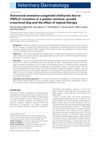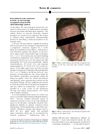 13 citations,
July 2001 in “International Journal of Dermatology”
13 citations,
July 2001 in “International Journal of Dermatology” Inflammation and Demodex mites might contribute to hair loss, and targeting them could help treat it.
 10 citations,
July 2015 in “Current opinion in pediatrics, with evaluated MEDLINE/Current opinion in pediatrics”
10 citations,
July 2015 in “Current opinion in pediatrics, with evaluated MEDLINE/Current opinion in pediatrics” New genes linked to ichthyosis were found, but there's still no cure; treatment options are improving.
 9 citations,
May 2016 in “Veterinary dermatology”
9 citations,
May 2016 in “Veterinary dermatology” Long-term oral and topical treatments improved skin condition in a goldendoodle with a genetic disorder.
 7 citations,
July 2003 in “Clinics in Dermatology”
7 citations,
July 2003 in “Clinics in Dermatology” The article helps identify common, non-harmful skin conditions in newborns to avoid undue concern and treatment.
 4 citations,
March 2006 in “Archives of Dermatology”
4 citations,
March 2006 in “Archives of Dermatology” The conclusion is that dermatologists can improve women's skin health but must overcome cultural and economic barriers to do so.
 2 citations,
November 2018 in “JAAD case reports”
2 citations,
November 2018 in “JAAD case reports” Drinking kava tea can cause a skin reaction with red, swollen bumps, which may improve with steroids.
 1 citations,
January 2015 in “Journal of nutrition & health”
1 citations,
January 2015 in “Journal of nutrition & health” Fish oil improves skin health in people with diabetes and high cholesterol.
 April 2017 in “The journal of investigative dermatology/Journal of investigative dermatology”
April 2017 in “The journal of investigative dermatology/Journal of investigative dermatology” Astrotactin2 affects hair follicle orientation and skin cell polarity.
 February 2010 in “Journal of The American Academy of Dermatology”
February 2010 in “Journal of The American Academy of Dermatology” Mimicking growth factors in a topical solution can prolong hair growth phase and reduce hair loss without side effects.
 February 2010 in “Journal of The American Academy of Dermatology”
February 2010 in “Journal of The American Academy of Dermatology” Surgery on a baby with a skin disorder improved eyelid position and eye health.
 February 2010 in “Journal of The American Academy of Dermatology”
February 2010 in “Journal of The American Academy of Dermatology” A woman's nail separation was likely caused by poor blood flow, and a treatment for similar conditions might help.
 March 1988 in “Archives of Dermatology”
March 1988 in “Archives of Dermatology” Topical minoxidil may not improve the appearance of balding men, according to a letter in this document.
 260 citations,
July 2010 in “Cell”
260 citations,
July 2010 in “Cell” Mutations in the SRD5A3 gene cause a new type of glycosylation disorder by blocking the production of a molecule necessary for protein glycosylation.
 126 citations,
January 1987 in “Journal of The American Academy of Dermatology”
126 citations,
January 1987 in “Journal of The American Academy of Dermatology” The document concludes that understanding hair structure is key to diagnosing hair abnormalities and recommends gentle hair care for management.
 109 citations,
September 2011 in “Human molecular genetics online/Human molecular genetics”
109 citations,
September 2011 in “Human molecular genetics online/Human molecular genetics” New treatments targeting specific genes show promise for treating keratin disorders.
 86 citations,
December 2001 in “Experimental dermatology”
86 citations,
December 2001 in “Experimental dermatology” Mutant mice help researchers understand hair growth and related genetic factors.
 81 citations,
June 2012 in “European journal of human genetics”
81 citations,
June 2012 in “European journal of human genetics” Inherited ichthyoses cause widespread skin scaling and thickening due to gene mutations.
 74 citations,
March 1963 in “Archives of Dermatology”
74 citations,
March 1963 in “Archives of Dermatology” Triparanol therapy can cause hair loss and skin dryness without inflammation or damage to hair follicles or skin structures.
70 citations,
January 2014 in “International review of cell and molecular biology” Keratin proteins are crucial for healthy skin, but mutations can cause skin disorders with no effective treatments yet.
 66 citations,
June 2018 in “British Journal of Dermatology”
66 citations,
June 2018 in “British Journal of Dermatology” European guidelines recommend regular eye and ear exams, skin care, vitamin D supplements, and cautious use of medications for managing congenital ichthyoses.
 65 citations,
January 2009 in “Pediatric Dermatology”
65 citations,
January 2009 in “Pediatric Dermatology” The most common skin problems in Indian children are infections and eczemas.
 59 citations,
June 2008 in “Journal of The American Academy of Dermatology”
59 citations,
June 2008 in “Journal of The American Academy of Dermatology” The article explains the genetic causes and symptoms of various hair disorders and highlights the need for more research to find treatments.
 52 citations,
June 1981 in “International Journal of Dermatology”
52 citations,
June 1981 in “International Journal of Dermatology” Oral retinoids are effective for severe skin conditions but require careful use due to side effects.
 46 citations,
January 2010 in “The journal of investigative dermatology/Journal of investigative dermatology”
46 citations,
January 2010 in “The journal of investigative dermatology/Journal of investigative dermatology” Mice lacking Insig proteins had hair growth problems due to cholesterol buildup, but this was fixed by the drug simvastatin.
 46 citations,
January 1996 in “Journal of The American Academy of Dermatology”
46 citations,
January 1996 in “Journal of The American Academy of Dermatology” People with late-stage HIV-1 often experience a specific type of hair loss linked to multiple factors, including nutritional issues and immune responses.
 42 citations,
January 2007 in “Pediatric dermatology”
42 citations,
January 2007 in “Pediatric dermatology” Low-potency steroids can cause serious side effects in people with skin conditions like Netherton syndrome.
 41 citations,
November 2011 in “The Journal of Dermatology”
41 citations,
November 2011 in “The Journal of Dermatology” Some hair loss disorders are caused by genetic mutations affecting hair growth.
 41 citations,
March 2010 in “Psychology Research and Behavior Management”
41 citations,
March 2010 in “Psychology Research and Behavior Management” Using psychological treatments can help manage skin conditions along with regular medical care.
 36 citations,
August 2018 in “Dermatologic Clinics”
36 citations,
August 2018 in “Dermatologic Clinics” Trichoscopy is a useful tool for diagnosing hair disorders without pulling out hair.
 36 citations,
January 2012 in “International Journal of Trichology”
36 citations,
January 2012 in “International Journal of Trichology” Losing eyelashes or eyebrows can be a sign of many different health problems and needs a careful approach to treat effectively.





























